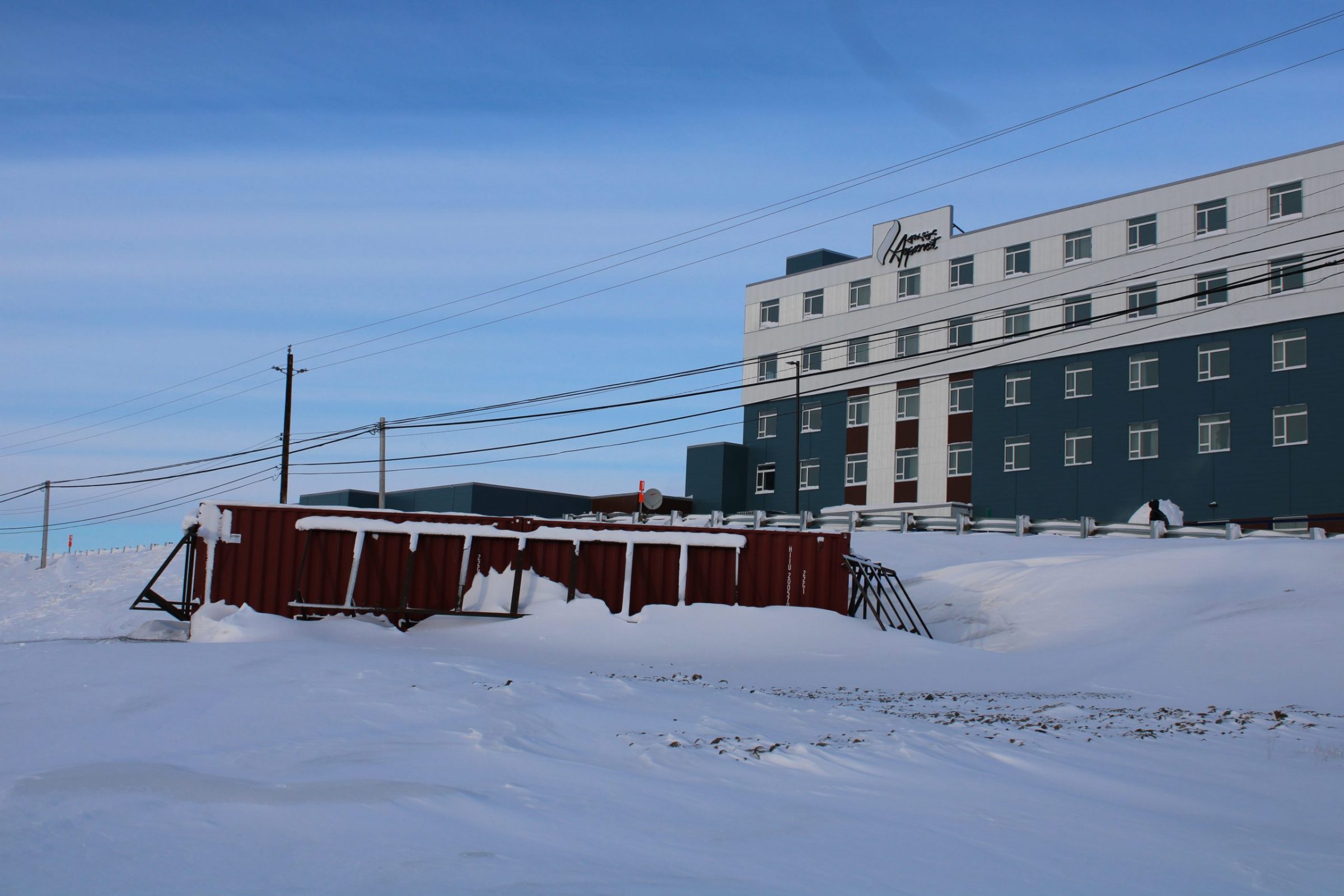Off the grid: Iqaluit hotel aims for energy independence
Qikiqtaaluk Corp. subsidiary hopes microgrid can prove renewable energy is sufficient and cost-effective
Nunavut Nukkiksautiit Corp. is aiming to build a microgrid with renewable energy for the Aqsarniit Hotel in Iqaluit. The corporation hopes it will be operational near the end of 2024. The solar panels in the microgrid will be placed atop the red seacan seen here. (Photo by David Lochead)
Updated Friday, Feb. 10 at 1:20 p.m.
It’s a science project fit for a hotel.
To prove sufficient energy can be produced without relying on a regional power grid, Nunavut Nukkiksautiit Corp. is constructing a microgrid system at the Aqsarniit Hotel and Conference Centre in Iqaluit.
A combination of solar power, battery storage and diesel energy will power the building. Meanwhile, the system will trap heat from its diesel generation to heat the hotel in winter.
The project should allow Aqsarniit to unplug from the larger, citywide grid operated by Qulliq Energy Corp.
The result: energy independence.
“This will be a nice way to show that we can do it,” said Heather Shilton, director of Nunavut Nukkiksautiit, the renewable energy subsidiary of the Qikiqtaaluk Corp. The corporation also owns the Aqsarniit hotel.
The other goal, Shilton said, is to demonstrate that renewable energy can be effective and economical.
Nunavut Nukkiksautiit initially hoped to connect the project to QEC’s grid.
But to do that, the corporation would have had to sign on to QEC’s Commercial and Institutional Power Producers program. That move wouldn’t have made financial sense for the corporation, Shilton said.

Heather Shilton, of Nunavut Nukkiksautiit Corp., says the Aqsarniit Hotel and Conference Centre in Iqaluit should eventually see savings through a microgrid power system. (Photo courtesy of Heather Shilton)
The plan is to construct the microgrid by fall 2024 and be operational soon after that.
The total cost will be $7 to $8 million.
Qikiqtani Inuit Association gave Nunavut Nukkiksautiit $2.8 million for the project in January, at its annual general meeting.
The federal government also contributed money through Natural Resources Canada’s Clean Energy for Rural and Remote Communities program.
The aim is for 20 per cent of the energy provided from the microgrid to be renewable.
Shilton said it should also be cheaper to power the hotel but it will take a few months after it’s operational to collect data and get a more precise account of savings.
She said she hopes this project can be an example for future renewable energy projects in the territory.
“I think it’ll be a nice project from that perspective,” Shilton said.
Correction: This article has been updated from a previous version to note Nunavut Nukkiksautiit Corp. is a subsidiary of Qikiqtaaluk Corp., which also owns the Aqsarniit hotel.






Mr pothead for ur correction it’s qiqitaaluk corporation owned sorry if I spelt ur family name wrong welcome to nunavut are spoken language is inuktitut have a great day.
Great job Nunavut Nukkiksautiit Corp! Be a leader in this space in Nunavut! Do not wait for QEC to emerge from the dark ages of renewable energy and catch up to the rest of the world, their plans and policies are self serving and limiting for this industry in Nunavut.
Notice to readers : being off grid does not mean going from 1 diesel generating source ( QEC ) to your own diesel generating source !!!!!
I salute the solar panels and the battery storage but the rest is just greenwashing.
NCPC has for the longest time used the heat generated by the diesel generation to provide heat .
The only difference is the massive influx of federal money that is raining on the north in the last few years.
Thank you
I’ve noticed the new funding for the north too, instead of all the cuts from before.
Atop seacans, seriously?
That was my first reaction when I read the piece the first time.
If plans are to have the hotel operating for a long period, it should make sure a proper storage and operation for batteries is safe and un-accessible by whom wants to do any damages.
I working in iqaluit and y looking for a lot place dont use de recovery for Heating de building or water or someting , exemple arena when you make a ice you remove the heat of the water to make ice the water is a 50 degr and ice begin to 32 you have 18 degre free and more if you dont use you put out side the bulding etccc y think you need more aid for a lot project . Sorry for my english beacause i dont have a chance to practice , text me or email if you would like a self-sufficiency growing project on vegetables and other growing in nunavut and communities,
My guess is a couple of General Motors generators will deliver electricity at half or less what the hotel now pays and, in addition, capture the free heat. No cost of bureaucracy, infrastructure and BS. But might as well forget about the green nonsense though. That 20 percent isn’t worth bothering with.
Hardly renewable if you’re just going from public diesel to private diesel. They could just have added solar panels to the whole building and probably cut their usage in half with 5% of the cost and no new diesel, iqaluit needs to explore real renewable options like hydro, mini nuclear or other such technologies.
Anything, no matter how harebrained, in order to suck up a pile of federal subsidies.
I find this initiative both exciting and challenging.
It is exciting because it was part of the plan when the idea of the hotel was first announced.
It is exciting because it will demonstrate the potential for alternate energy resources being used across Nunavut.
The project is challenging because while diesel engines can run almost silently, they have exhaust which smells. Tourists and hotel guests don’t expect exhaust odours .
There is no question that the generator will be running in the December and January period.
It is most concerning because of what happens if the self contained system fails. Does the hotel then go to QEC for electricity to operate the hotel? The hotel has not invested in the costs of operating and maintaining the existing power plant but they may need it’s electricity in future.
The net metering program would make sense if your project actually included a reasonable amount of renewable energy.
How is it that the material for the solar panels is renewable?
Do plastic, silicon, and metals grow on trees in the Arctic? Are trees refining the minerals in special smelters? Are the solar panels manufactured, shipped, and constructed renewably. Are the electrical lines, panels, outlets produced by renewanke elvey thingies?
Curious minds are asking questions of Heather Shilton, director of Nunavut Nukkiksautiit (the renewable energy subsidiary of the Qikiqtaaluk Corp, which also owns the Aqsarniit hotel).